
The mystery of black spots on dog tongues
When your pup opens up and says “aah” for a teeth cleaning, gives you tons of licks and kisses or just displays his goofy, normal behavior, have you ever noticed a black spot on his tongue? Whether it’s been there his whole life or appeared seemingly overnight, you’ve probably wondered what caused it—and if there’s cause for concern. So, should you be worried about a black spot on a dog tongue?
Because your dog’s health is nothing to mess around with, we spoke with a veterinarian to get the lowdown. Find out if these dark spots pop up on the most popular dog breeds, even the healthiest dog breeds, and when you should seek a professional opinion. Also, if this reminds you that you’re not brushing your dog’s teeth enough, pick up one of these top-rated dog toothbrushes to make the experience a whole lot easier.
Get Reader’s Digest’s Read Up newsletter for more fascinating facts, humor, cleaning, travel and tech all week long.
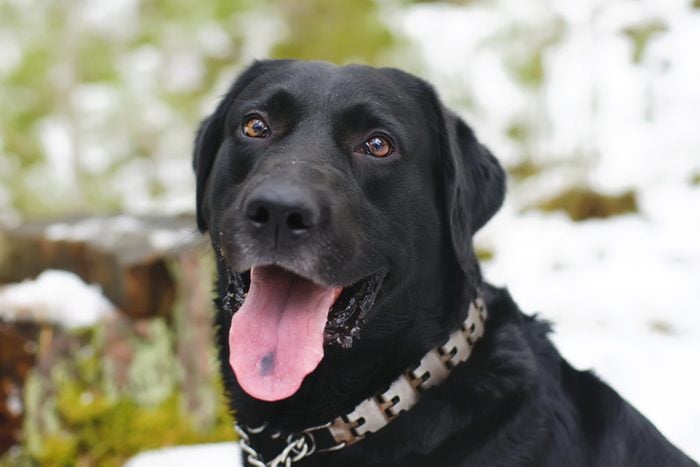
What does a black spot on a dog’s tongue mean?
We have some good news for you: If you’ve ever noticed one or more black spots on your dog’s tongue, they’re almost never cause for concern. “Black spots on a dog’s tongue are typically nothing more than pigmentation and are completely harmless,” says Brian Evans, DVM, medical director at Dutch, an online veterinary service. Your puppy may be born with one or more black spots on her tongue, or they may develop well into a dog’s adult life.
Whether there’s one little spot, a big blotch that covers most of his tongue or several black spots on the tongue and around your dog’s mouth, the cause is almost always the same: pigmentation. Think of it as the equivalent of a birthmark or a strangely placed freckle—and part of his unique genetic “paw print.”
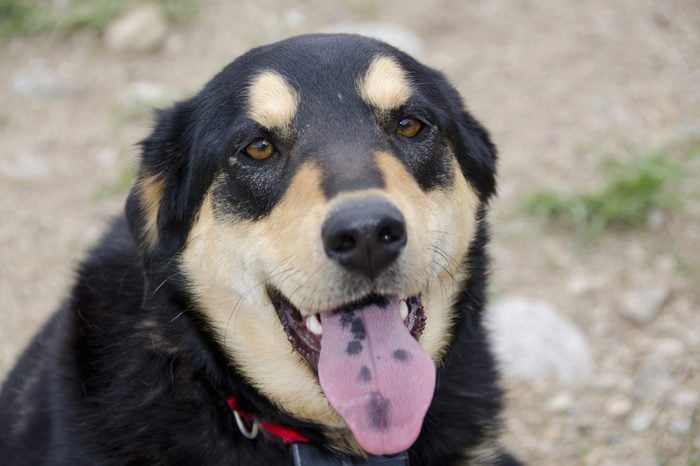
Why do some dogs have black spots on their tongues?
If there’s an evolutionary riddle about why some dogs have black spots on their tongues, it remains unsolved. “These black spots have no known function,” says Dr. Evans. “They appear to be a random accumulation of pigment in certain areas of the tongue.” While some genetic traits in domestic dogs (such as long noses) are holdovers from centuries of selective breeding, and others have evolutionary roots, black or spotted-black tongues offer no apparent advantage or disadvantage to a dog. They also don’t affect a dog’s sense of taste.
There is, however, a genetic component. If one or both of a dog’s parents have spotty tongues, it’s likely their offspring will develop them too, though this isn’t guaranteed. And unlike some genetic variants in dogs, such as blue eyes, there’s no risk to a dog’s future litters if two dogs with blotchy tongues breed.
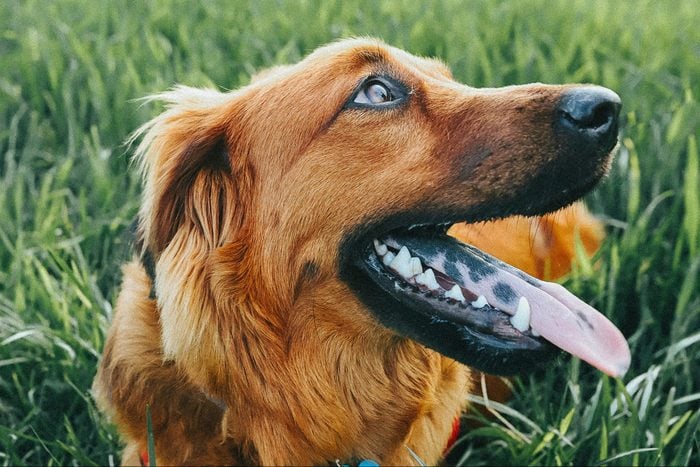
Which dog breeds have black spots on their tongues?
No dog breeds have spotted tongues as part of their breed standard, according to Dr. Evans. The closest exception is the chow chow, which, in its purebred form, always has a solid pigmented tongue—typically a variation of black, gray, blue or purple. Though they’re born with pink tongues, chows develop a solid dark-colored tongue by the time they mature. (According to the American Kennel Club, chows with spots are not considered purebred.) A blue-black tongue is also the breed standard for Chinese Shar-Peis.
There’s a common misconception that any other dog with black spots on its tongue shares some DNA with chows, or that it’s not a purebred dog. That’s not necessarily true, as black spots on a dog’s tongue can occur in any breed. It’s more common, however, with about 30 breeds, including Labradors, German shepherds and Dobermans, as well as several hounds. This isn’t limited to large dog breeds, though. Plenty of pint-size pups, including pugs, Pomeranians and bichon frisés, also frequently present with these black spots.
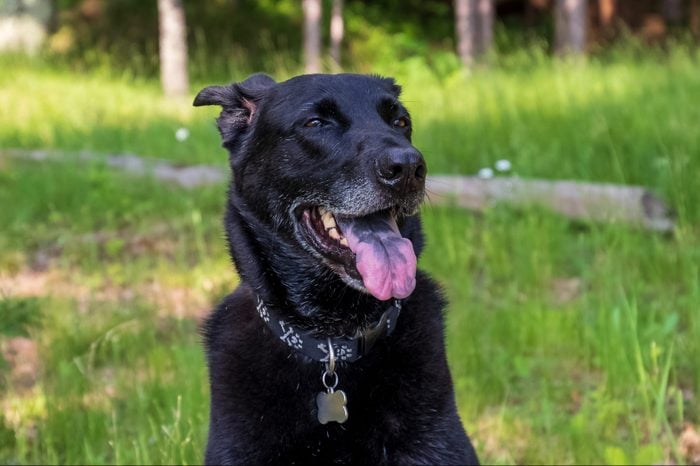
How can you tell if a black spot on a dog’s tongue is abnormal?
If the black spots on your dog’s tongue have always been there, chances are high that there’s nothing to worry about. But, just like with human birthmarks, it’s important to notice any changes in the characteristics of the spots. “While spots on the tongue are typically harmless,” says Dr. Evans, “if the spots are raised or have a different texture than the rest of the tongue, this could be a sign that there is something else happening and should be evaluated by your veterinarian.” The same goes if a spot appears and develops rapidly; most normal spots typically start out lighter and smaller, then grow and turn darker gradually.
So, what could be the issue? A serious vitamin deficiency could cause a dog’s tongue to turn black, or it could be a sign of an advanced tumor. However, most serious illnesses that affect a dog’s tongue will also present with other symptoms, such as foul-smelling breath, difficulty eating or excessive drooling. If a black spot appears but everything else is fine, your pup is likely OK … but, of course, it’s always a good idea to check with your vet, just in case.
In general, make sure to inspect your dog’s tongue regularly. Oral health is important, and when something’s amiss, it could be a subtle sign that your dog is sick.
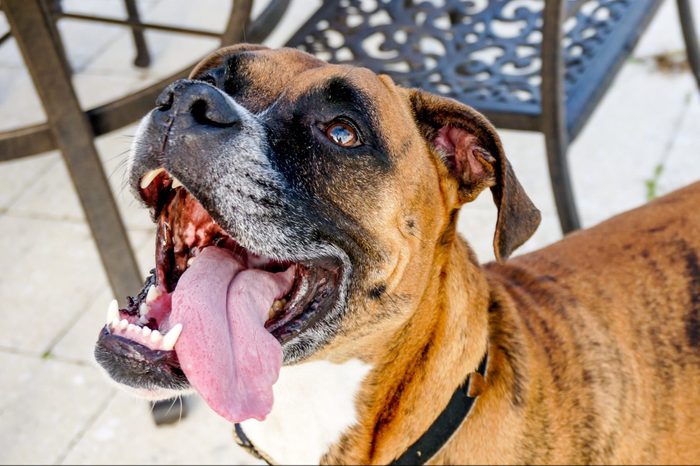
What other kinds of spots can dogs have on their tongues?
If your dog’s otherwise perfectly pink tongue includes some lighter splotches of pink, this can indicate a scar from previous trauma. This might be the result of thorns, burrs or tangling with the neighbor’s cat.
But sometimes there is cause for concern. If the spots are brown or foul-smelling, Dr. Evans says a trip to the vet is in order. These signs, along with any visible irritation, swelling or discoloration in the gums and tongue, signal a serious problem, which might involve insect stings, fungal infections, periodontal disease and oral cancers. As always, watch your dog’s behavior. If you notice that she is in discomfort, has difficulty eating or drinking, or drools excessively, head to the vet right away.
Now that you know what those black spots on a dog’s tongue mean, unravel another canine mystery: what it means if you see a dog with a red collar.
Sources:
- Brian Evans, DVM, medical director at Dutch
- AKC: “Why Do Chow Chows Have Blue Tongues?“
- AKC: “Chinese Shar-Pei“
